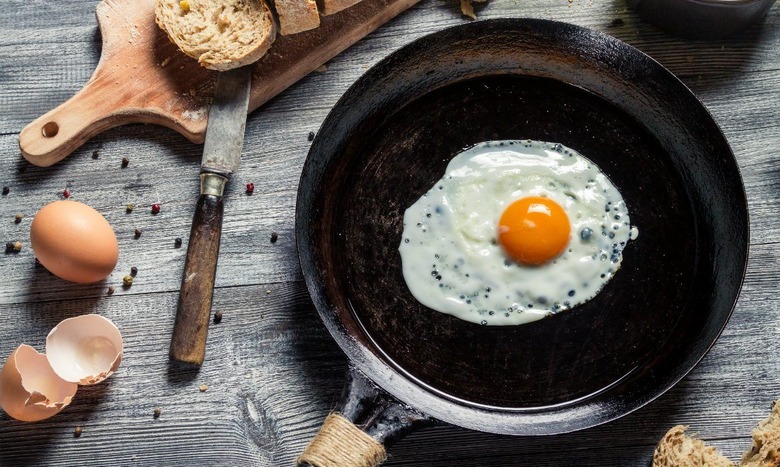Try These Hacks To Make The Perfect Sunny Side Up Egg
Most people have fried an egg, but sunny side up eggs — perfectly cooked — are a rarity. It's just not scientifically sound to expect that two things, — like a yolk and egg white — one mostly protein and the other fat, to cook at the same temperature for the same amount of time. But that is exactly what a sunny side up egg preparation demands.
If you want those picture perfect eggs, you really need to know what you are doing. Crisp whites and runny yolks don't just make themselves, which is why we have looked around at what experts have suggested in the past and coupled it with some of our own fried-egg experience to come up with a few tricks that will ensure you end up with the perfect sunny side up egg on your plate, every time.
Honestly, your fried-egg preferences are largely based upon personal inclination, which is why as we tested the many different ways to cook a fried egg, we found differing results that were all good — the perfect sunny side up egg is a matter of taste.
Butter, Oil, or Lard?
While bacon fat will offer the best flavor, a mild-flavored oil will produce the cleanest looking egg, and rich butter, in my opinion, is the perfect in-between when cooking a flavorful, beautiful egg. The most important secret is adding enough fat because, after all, you are frying the egg. Enough fat will help to quickly cook the whites before the yolk becomes overcooked and chalky.
What Cooking Temperature?
Quick-cooking your egg at a high heat for 30 seconds and then reducing the heat to medium for another minute will produce a crisp (albeit tough) white, without overcooking the yolk.
Basting the egg with your chosen fat at a medium-high heat will take about 30 seconds and produces an evenly browned (which you may or may not want) white with a runny yolk. The flavor of a butter-basted egg is rich because of the even caramelization.
Then, you can cook eggs at medium-low temperature. Slowly cooking the eggs produces the most tender egg, which is perfect if you want a smooth texture, not so great if you prefer crisped whites.
Lid or No Lid?
We can't help but be pro-lid. Obviously, the lid trick can't be used if you are basting the egg with butter, but for a foolproof fried egg, it seems to get the job done. Set your pan over low heat. Melt the butter and let it foam before adding your eggs. Then, cover the pan with a lid (a clear, glass lid lets you keep an eye on your eggs' progress). Cook until the whites are just set (about 2 to 3 minutes) and the yolks still run when pierced with a fork.
